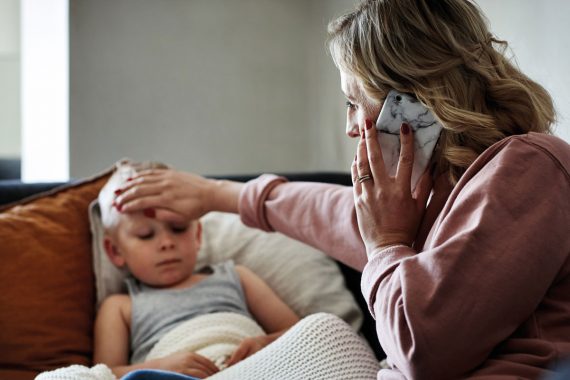GPs should urgently review Covid-19 shielding lists and remove all children who no longer count as clinically extremely vulnerable, ahead of an ‘imminent’ update to guidance from the Government.
GPs should also urgently add all adults with Down’s syndrome, and those with stage 5 chronic kidney disease, to the list, NHS England said.
In a letter to practices sent yesterday evening, primary care director Dr Nikki Kanani said the Government is ‘imminently’ expected to update the ‘advice and support available for people who are clinically extremely vulnerable alongside the new national restrictions’ coming into effect from Thursday.
However the letter made no mention of the Government’s long-awaited new algorithm for calculating Covid-19 risk – which has identified those who are male, from a BAME background, over 70 and with certain health conditions such as diabetes as most at risk of death from coronavirus.
Acknowledging that this is ‘an extremely challenging time’ for GP practices, Dr Kanani said NHS England is ‘asking practices’ to ‘familiarise’ themselves with this updated guidance.
It is also asking practice to ‘immediately review any children and young people remaining on the [shielding patient list] who your practice added and, where appropriate, remove them from the SPL’.
GPs should ‘plan to urgently respond to calls from parents and guardians of children on the SPL seeking a review’, as ‘parents and guardians will be advised by Government to contact their child’s specialist or their GP, if they are still unsure whether their child should remain on the SPL’, the letter added.
Dr Kanani stressed that the ‘vast majority of children and young people who have been reviewed to date using the Royal College of Paediatrics and Child Health (RCPCH) guidance have been found to be no longer considered clinically extremely vulnerable’.
She added: ‘Given the detrimental impact to children’s wellbeing of following unnecessary additional restrictions, it is important we
complete this exercise as soon as possible.’
GPs should also ‘urgently identify, contact and flag adults with Down’s syndrome,’ the letter said, adding that practices ‘may also want to take the opportunity to ensure they receive a flu vaccine and to schedule an annual health check if these are needed’.
Practices should ‘continue to maintain’ the shielding patient list ‘by adding a high risk flag for patients you identify as being clinically extremely vulnerable, and notifying the patient of their status and the advice they should follow’, the letter said.
Dr Kanani concluded: ‘I know all of us want to ensure that those who are clinically extremely vulnerable continue to fully access appropriate NHS care… Thank you for all your continued work to identity and support our patients at greatest risk in a week when I know that there are multiple requests on your time.’
GP experts have criticised the Government’s recently ‘unclear’ guidance to clinically extremely vulnerable patients as well as the delay to the promised new shielding risk algorithm, which had originally been due in September.
Government information regarding the new Covid-19 restrictions coming into force from Thursday said: ‘Over this period, we are advising the [clinically extremely vulnerable] to work from home. If you cannot work from home, you are advised not to go to work and may be eligible for Statutory Sick Pay (SSP) or Employment Support Allowance (ESA). You are encouraged to stay at home as much as possible, but are encouraged to go outside for exercise.’
It added that ‘full new guidance’ regarding shielding would ‘be published on Monday 2 November’ and that ‘the Government will write to everybody who is clinically extremely vulnerable to set out detailed advice while the new restrictions are in place’.
While the Government’s promised guidance remains unpublished, the Local Government Chronicle reported yesterday that local councils will be given £14 per extremely vulnerable patient in their area ‘to ensure they have essential supplies’ under a new ‘local’ shielding framework.
Speaking yesterday, RCGP chair Professor Martin Marshall told Pulse that the Government’s ‘decision not to reintroduce the same sort of shielding programme we saw in March’ was ‘encouraging’, because ‘the unintended consequences for patients who have been shielding, affecting both physical and mental health, have been significant’.
But he added that it is ‘vital that as further lockdown restrictions are implemented, patients in clinically vulnerable groups are supported to keep as safe as possible with strong public messaging about how those most at risk can keep themselves safe to allow them to make an informed decision about what steps to take’.
‘It remains essential that GPs have updated guidance on what patients are deemed clinically vulnerable, so they can advise and support these patients appropriately – and that work continues to develop risk assessment tools, so that this advice can be tailored as much as possible to those who need it most.’
Pulse October survey
Take our July 2025 survey to potentially win £1.000 worth of tokens













What spare time do I have in the day to do this?
NHSE just love a good list don’t they, particularly when it infantilises our patients and results in regular ‘wellbeing’ calls. Lists for what purpose exactly? Shielding lists may well not be so sought after by those with conspiratorial leanings if it comes to prioritising and choosing who is offered intensive care as the beds fill up.